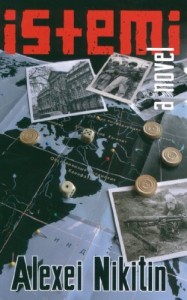#12 Istemi by Alexei Nikitin
 I bought Istemi because it was translated by somebody I know. That’s ‘know’ in the internet sense, rather than the gnostic or biblical senses. I’ve never actually met Anne Marie Jackson but in the way that writers get to know other writers partly by their words and partly by their works, I was interested to see what her work as a translator was like. Also, heading to Marrakech for a week, I wanted to stick to my habit of not reading anything about a country that I’m visiting. Miss Smilla’s Feeling for Snow I read in Mexico, Utz in China, A Gesture Life in the Scottish Highlands, so reading a novel about Russia in Morocco seemed perfectly right to me.
I bought Istemi because it was translated by somebody I know. That’s ‘know’ in the internet sense, rather than the gnostic or biblical senses. I’ve never actually met Anne Marie Jackson but in the way that writers get to know other writers partly by their words and partly by their works, I was interested to see what her work as a translator was like. Also, heading to Marrakech for a week, I wanted to stick to my habit of not reading anything about a country that I’m visiting. Miss Smilla’s Feeling for Snow I read in Mexico, Utz in China, A Gesture Life in the Scottish Highlands, so reading a novel about Russia in Morocco seemed perfectly right to me.
When I started to write this review I did something I rarely do. I searched other reviews and couldn’t find any, so I can’t actually tell if I am, or am not, off beam in my response to this novel. So – first off: spoiler alert – potentially.
Istemi spans twenty years, starting in 1984 and ending in 2004. When the novel begins, Ukraine is in the grip of the USSR and five science students, bored with their studies devise a game of war with imaginary countries, rulers and rules of engagement. Their fantasy disturbs the KGB which hauls them into an interrogation which becomes something both more and less than questioning. The five survive the process but are released to discover that their world has been destroyed in the weeks they were locked away: expelled from university, unable to find work, one becomes insane, another goes to fight in Afghanistan, one makes good and our protagonist, Davidov who had played the ruler Istemi in the game, becomes a Kafka-esque functionary (is there any other kind of functionary, I wonder?) in a crazy bureaucracy. Two decades after their lives fell apart, several of the five receive an ultimatum by email … the same ultimatum they wrote, as a group, to initiate their imaginary war game.
It’s a fascinating exploration of a country, Ukraine, and a culture in the transition from orderly oppression to free market economics, without seeming to gain anything much in the process. In part metaphysical – the parallels between the ‘war game’ and the reality of Soviet life are clear and the effects of perestroika are as varied as the effects of interrogation on the five students.
So, that spoiler. The novel opens in 2004 with Davidoff receiving an email to his account – istemi@ukr.net. He created the account at an unstated point – but long after the arrest and change of circumstances that transformed him from science student to office worker in a fizzy drinks business. The ultimatum contained in the email is the official declaration of war which opened the game he played with four friends, and which destroyed his life. In exploring who sent the email to all of them, twenty years later, Davidov’s life implodes again. But when we discover who sent the email, one question remains unanswered – how did that person obtain the email address Davidov created long after the last time he saw the ultimatum sender? The suggestion is that the KGB’s hand still rests on the five (now four, one died in Afghanistan, as far as anybody knows) but how, and why is never made clear.
As a novel it’s complex, chilly, often confusing in its movement from 1984 to 2004, deep in detail of some lives whilst others get glossed over in a couple of sentences. For example one of the students tries to fake mental illness to avoid conscription, is taken seriously by the doctors and institutionalised for life – just as briefly as that. David/Istemi takes a remote, scientific view of his own life, reporting his failed dreams, his lost hopes, his romantic failures as dispassionately as the results of an experiment. On the whole it’s fascinating.


Recent Comments